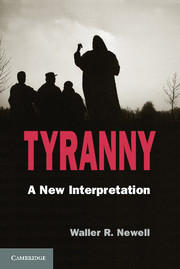Book contents
- Frontmatter
- Contents
- Acknowledgments
- Introduction
- 1 Is There an Ontology of Tyranny?
- 2 The Tyrant and the Statesman in Plato's Political Philosophy and Machiavelli's Rejoinder
- 3 Superlative Virtue, Monarchy, and Political Community in Aristotle's Politics
- 4 Tyranny and the Science of Ruling in Xenophon's Political Thought
- 5 Machiavelli, Xenophon, and Xenophon's Cyrus
- 6 Glory and Reputation
- 7 The Republic in Motion
- Conclusion
- Epilogue
- Bibliography
- Index
3 - Superlative Virtue, Monarchy, and Political Community in Aristotle's Politics
Published online by Cambridge University Press: 05 May 2013
- Frontmatter
- Contents
- Acknowledgments
- Introduction
- 1 Is There an Ontology of Tyranny?
- 2 The Tyrant and the Statesman in Plato's Political Philosophy and Machiavelli's Rejoinder
- 3 Superlative Virtue, Monarchy, and Political Community in Aristotle's Politics
- 4 Tyranny and the Science of Ruling in Xenophon's Political Thought
- 5 Machiavelli, Xenophon, and Xenophon's Cyrus
- 6 Glory and Reputation
- 7 The Republic in Motion
- Conclusion
- Epilogue
- Bibliography
- Index
Summary
In this chapter, I look at an important ambiguity in Aristotle's political philosophy – the issue of whether the “best regime” is a self-governing republican aristocracy (the theme of Books 7 and 8 of the Politics) or the much more muted claim that there may be a single ruler of superlative virtue and prudence who might rule over many “cities and peoples” according to the art of household management, a rational monarchy of the kind sometimes associated with Alexander the Great but also with Xenophon's idealization of Cyrus the Great. I argue that Aristotle mutes the claim because, while true, it would undermine the integrity and claim to merit of the self-governing political community that is at the forefront of his political philosophy. Although arguably more rational, the monarchy of the “best man” is a regime in which citizenship vanishes altogether under the architectonic art of household management conducted by an all-powerful ruler. Hence, what is true, strictly speaking, according to reason may have to retract its claims in order that the political community of shared civic deliberation can flourish in its own right. This, as we will see, is the context for Aristotle's well-known and forthright critique of what he takes to be Plato's insistence on excessive unity for the city, the Platonic Socrates’ failure to distinguish theory from prudence, and his belief in the unity of virtue. Yet Aristotle's own analysis of political authority cannot entirely exclude his partiality toward precisely the kind of rational monarchy for which he takes Plato and the Platonic Socrates to task.
By way of conclusion, I compare Aristotle's notion of the “architectonic” monarchy of the man of “superlative virtue” with Hobbes's prescription for monarchy to show that, despite some surface resemblances, the Hobbesian Sovereign is a fundamental departure from Aristotle's rational monarch. Whereas Aristotle's monarch exercises his superlative virtue as the fulfillment of his nature within a cosmos that is itself architectonically and teleologically ordered, Hobbes's Sovereign harnesses the art of household management in the service of an explicitly modern project, inspired by Machiavelli and Bacon, for the conquest of nature. Hence, whereas for Aristotle monarchy requires the highest degree of virtue within the natural order, for Hobbes, sovereignty is entirely a matter of the correctly applied method for reconstructing nature, especially human nature.
- Type
- Chapter
- Information
- TyrannyA New Interpretation, pp. 141 - 185Publisher: Cambridge University PressPrint publication year: 2013

